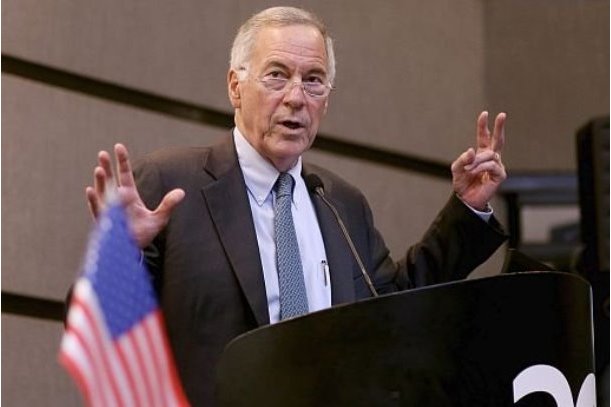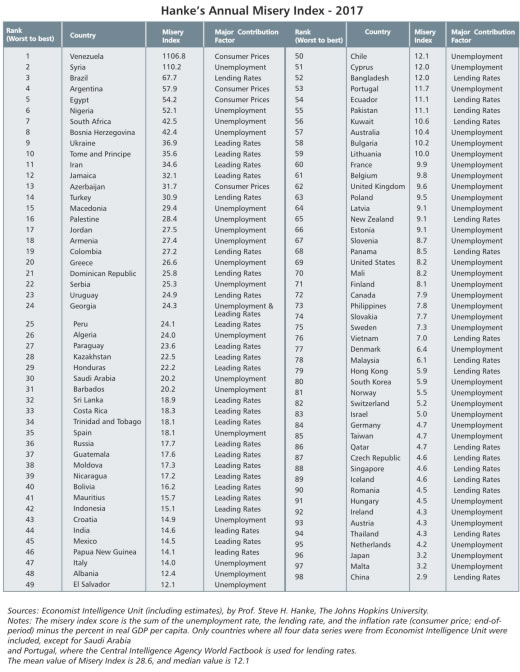Hanke’s Annual Misery Index: The World’s Saddest (And Happiest) Countries

Feature Highlight
The Misery Index is a simple-enough metric that a busy president can understand at a glance.
Editor’s Note: Nigeria ranked 6th on Hanke's Misery Index 2017, behind Egypt, and with an index score of 52.1. The major contributing factor to the country’s score was unemployment.
The human condition inhabits a vast continuum between "miserable" and "happy." In the sphere of economics, misery tends to flow from high inflation, steep borrowing costs and unemployment. The most surefire way to mitigate that misery: economic growth. All else equal, happiness tends to blossom when growth is strong, inflation and interest rates low, and jobs plentiful.
Many countries measure and report these economic metrics on a regular basis. Comparing them, nation by nation, can tell us a lot about where in the world people are sad or happy.
Would you consider the United States to be more or less miserable than other countries? To answer this question, I update my annual Misery Index measurements.
The first Misery Index was constructed by economist Art Okun in the 1960s as a way to provide President Lyndon Johnson with an easily digestible snapshot of the economy. That original Misery Index was just a simple sum of a nation’s annual inflation rate and its unemployment rate. The Index has been modified several times, first by Robert Barro of Harvard and then by myself.
My modified Misery Index is the sum of the unemployment, inflation, and bank lending rates, minus the percentage change in real GDP per capita. Higher readings on the first three elements are “bad” and make people more miserable. These are offset by a “good” (GDP per capita growth), which is subtracted from the sum of the “bads.” A higher Misery Index score reflects a higher level of “misery,” and it’s a simple enough metric that a busy president, without time for extensive economic briefings, can understand at a glance.
In the accompanying gallery, you can find Misery Index rankings for the 98 nations that report relevant data on a timely basis. For consistency and comparability, all data come from the Economist Intelligence Unit. 
Let’s start with the most miserable country and work toward the happiest. Flip it around and you have a Happiness Index.
Venezuela holds the inglorious title of the most miserable country in 2017, as it did in both 2016 and 2015. The failures of President Nicolas Maduro's socialist, corrupt petroleum state have been well documented over the past year, including by my measurements of Venezuela’s hyperinflation. Not only is Venezuela the most miserable country in the world, but its Misery Index score has dramatically increased since 2016.
Syria holds down the rank of second most miserable, and the reason isn’t hard to uncover. Indeed, Syria has now been in the grip of a brutal civil war for almost seven years. Need I say more?
Brazil remains in the number three spot for the second year in a row. As my close friend—the famous Brazilian economist, diplomat and politician, the late Roberto Campos—once explained to me during a visit to Brazília: the Brazilian Constitution is as thick as the New York City telephone book and is full of little more than rights and entitlements. President Temer has attempted to turn back the tide of government obligations. But, to date, his attempts to rein in the country’s biggest unfunded liability—the pension system—have come to naught. The bankrupt pension system is, of course, not the only problem facing Brazil. Corruption, for example, remains an endemic problem.
Argentina has improved its ranking (and index score) in 2017, moving from second to fourth most miserable country in the world. But, until inflation is wrestled to the ground, President Mauricio Macri will struggle—as President Carlos Menem did until April 1, 1991, when he introduced Argentina’s Convertibility System, which linked the peso to the greenback.
Egypt ranked fifth most miserable, a notch lower than in 2016. But, Egypt’s Misery Index score actually increased—a bad sign. President Abdel Fattah el-Sissi’s military-socialist rule continues to deliver misery. In addition to the problems that accompany any socialist-type system in which the military plays a decisive role, the Egyptian pound remains the country’s Achilles’ heel. The only solution to this problem is the adoption of a currency board, in which the pound would become a clone of an anchor currency, such as the euro or U.S. dollar.
Let’s move to the other end of the table—the end where the least miserable countries reside. It is there that we find China ruling the roost as the world’s “happiest” country. Chairman Xi has some bragging rights here, and in the World’s soft power sphere, these are valuable.
Now for the United States, its Misery Index score has improved a bit, moving from 9.4 in 2016 to 8.2 in 2017. Yet, as far as happiness is concerned, it is not America first but America thirtieth—trailing behind 29 other countries on the happiness train.
Steve H. Hanke is a Professor of Applied Economics at The Johns Hopkins University in Baltimore and a Senior Fellow at the Cato Institute in Washington, D.C. You can follow Prof. Hanke on Twitter: @Steve_Hanke.
Other Features
-
Expect turbulent asset markets in 2026
The negative impact of Trump’s tariff and immigration policies will be felt more acutely in 2026.
-
The scars of partition
Contrary to his rosy assurances, partitions often result in tragedy, as borders drawn by cartographers rarely align ...
-
Best site to sell Bitcoin in Nigeria (Fast BTC to Naira in 2026)
Apexpay stands out because it focuses on what Nigerian users actually want: speed, good rates, and simplicity.
-
The quiet influence of securitisation in financing Africa's energy ...
The scale of Africa’s energy transition demands financial solutions that are modern, secure, and scalable.
-
Lean carbon, just power
Why a small, temporary rise in African carbon emissions is justified to reach the continent’s urgent ...
-
Utilising the FTSA to unlock value in Nigeria’s gas production
Given the FG’s recent investment drive to fully monetise the country’s gas reserves, now is an opportune ...
-
Islamic finance posts double-digit growth in 2025
Forward-looking projections suggest that total assets are on track to cross USD 6 trillion by the end of 2026.
-
Can you earn consistently on Pocket Option? Myths vs. Facts breakdown
We decided to dispel some myths, and look squarely at the facts, based on trading principles and realistic ...
-
How much is a $100 Steam Gift Card in naira today?
2026 Complete Guide to Steam Card Rates, Best Platforms, and How to Sell Safely in Nigeria.
Most Popular News
- NDIC pledges support towards financial system stability
- Pan-African nonprofit appoints Newman as Advisory and Executive Boards Chair
- Artificial intelligence can help to reduce youth unemployment in Africa – ...
- World Bank approves $500m loan for small businesses in Nigeria
- UN adopts new consumer product safety principles
- AfDB mobilises $11 billion for investment-led development













